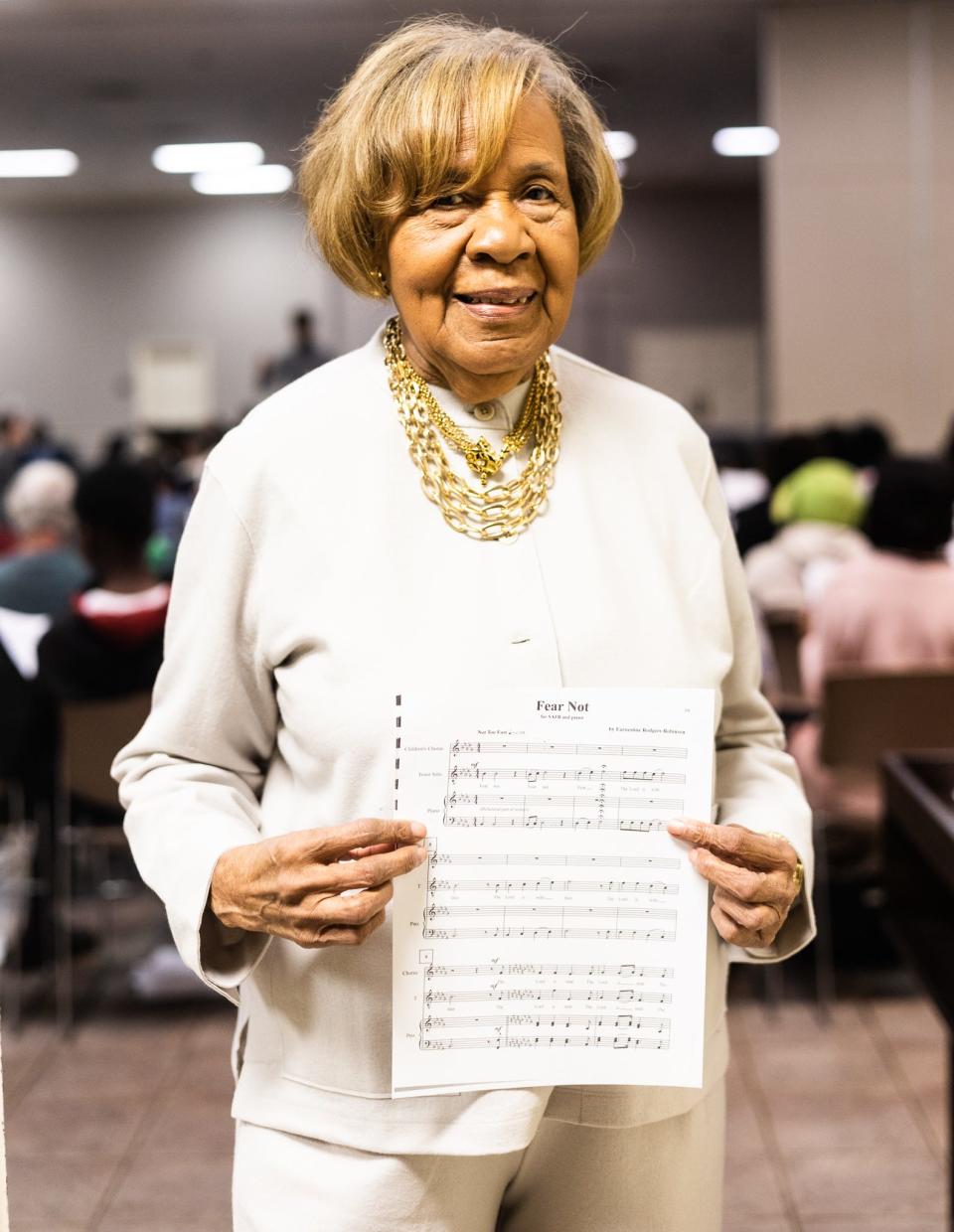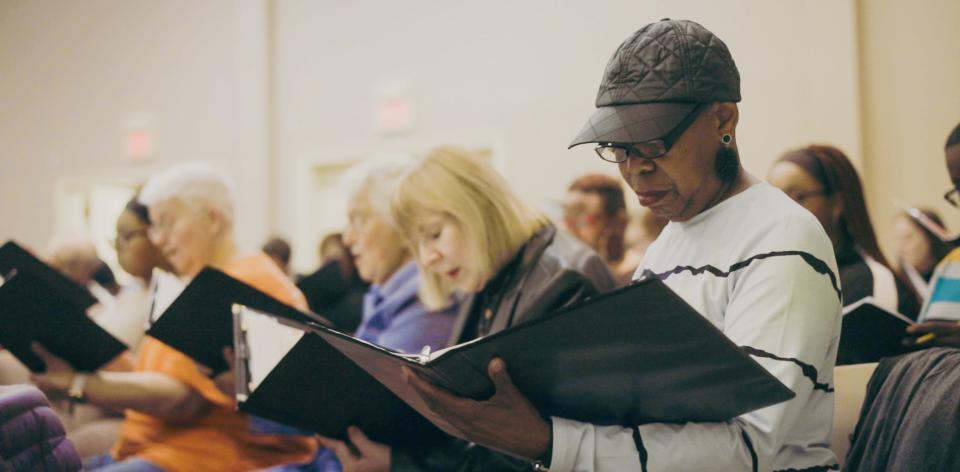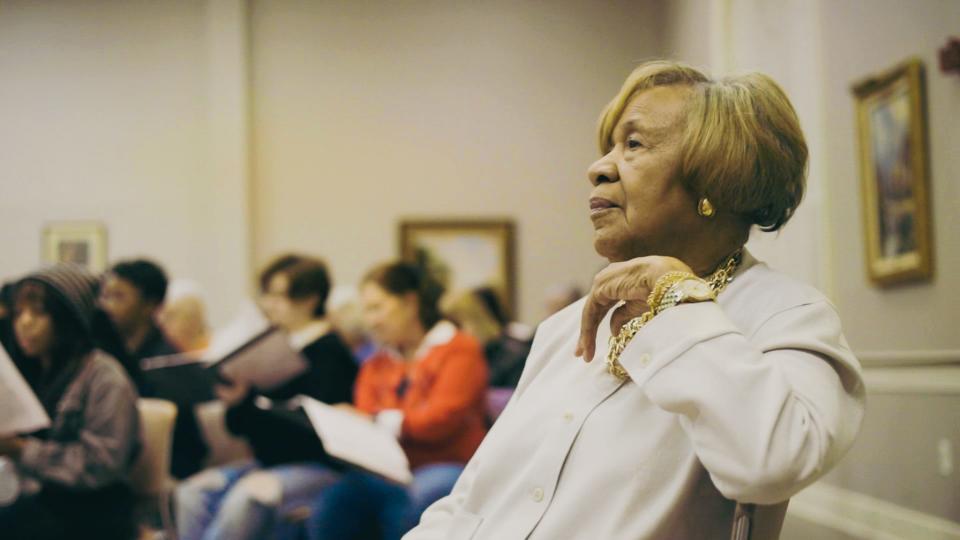Memphis composer marks milestone with hometown world premiere of Harriet Tubman piece
- Oops!Something went wrong.Please try again later.
The large-scale musical compositions of Earnestine Rodgers Robinson have debuted in Carnegie Hall and in the Czech Republic.
But Sunday's performance of Robinson's latest oratorio, devoted to fiery freedom fighter Harriet Tubman, will represent an overdue milestone.
For the first time, a work by the Memphis composer will have its world premiere in Memphis.
In fact, this is the first time one of Robinson's oratorios will be performed in Memphis, period.

“Those places where I went around the world, I was invited to go,” said Robinson, who celebrated her 86th birthday Feb. 2. “Memphis hadn’t invited me until now. But when I wrote about Harriet Tubman, it just seemed to be right and fitting to have it here in Memphis.”
Robinson said her "Harriet Tubman Oratorio" is intended to honor the famed abolitionist's "faith, her courage, her love for her fellow man, her resilience."
But even as the oratorio revisits the inspiring struggle of the escaped slave who helped organize the antislavery Underground Railroad network, it will shine a light on Robinson, whose journey is similarly distinctive.
Robinson is unusual in the classical music world. She is not just a Black woman composer but an entirely self-taught composer. She plays no instrument, and she did not begin to write music until she was in her 30s, by which time she was a so-called housewife and mother of five.
“This is highly unique,” said Memphis Symphony Orchestra assistant conductor Kyle J. Dickson, who will conduct Sunday's performance.
“We’re taught to believe that composers have to go to school for several years and play an instrument and study orchestration and the Western classical tradition of writing music," said Dickson, a trained violinist who studied at Northwestern University and was an assistant conductor to Esa-Pekka Salonen — arguably the world's most celebrated active conductor — in San Francisco. "Earnestine doesn’t have that background and she was still able to dictate this unusual music.”
Said Robinson: "I wasn't trying to break a barrier or anything, I was just doing what God designed me to do."
The 'Harriet Tubman Oratorio'
Set to debut at 2 p.m. Sunday. Feb. 11, at the Cannon Center for the Performing Arts, the "Harriet Tubman Oratorio" will require close to 150 performers, including the Memphis Symphony Orchestra and Memphis Symphony Chorus; two narrators; four vocal soloists; and choirs from Mississippi Boulevard Christian Church, White Station High School, Cordova High School and University Middle School.
“There is so much I’ll say welcome pressure when it comes to premiering a new piece,” said Dickson, who will conduct the performance on the heels of the recent sold-out performance of George Gershwin’s “Rhapsody in Blue” at Crosstown Theater, which he also conducted.
“It’s a real honor to work directly with the composer, which is something obviously you can’t do with ‘Rhapsody in Blue,’ for example. It’s liberating in a way because you’re trying to honor the intentions and expectations of the composer.”

In another milestone, the event represents the first Memphis Symphony performance presented in partnership with the National Civil Rights Museum.
“This is a way to lift up an American story of triumph and courage, and make it special and dynamic,” said museum president Russ Wigginton. He said the concert is appropriate to the museum’s mission statement ("We educate and serve as a catalyst to inspire action to create positive social change"); the event also is a testimony to the music culture of Memphis, “where you have so much talent that all genres are possible.”
Another interesting connection: While searching for a new home, Robinson and her family lived in the Lorraine Motel for four months in 1968, moving in three months after the assassination of Dr. Martin Luther King Jr. on a Lorraine balcony. The National Civil Rights Museum, which opened in 1991, was constructed around what human rights activists have called the "sacred ground" of the Lorraine.
BLACK HISTORY MONTH IN MEMPHIS: 8 things to do, from music to documentaries to a festival
'I never studied, but I knew how to arrange it'
Born and raised in North Memphis (where her father, the Rev. James Rodgers, was pastor of Homeland Church of God in Christ, in its original location), Robinson was valedictorian at Douglass High School and a promising mathematics student whose goal of being a school teacher was sidetracked after her marriage to Charles Robinson (a union that lasted 43 years, until Charles' death, in 2003). Her music experience was limited to church choirs and music appreciation classes in high school and at Fisk University.
In 1972, Robinson said, she was helping prepare a church music program when she began to read the New Testament verse that Christians consider among the most significant in the Bible, namely the sixteenth verse of the third chapter of the Gospel of John: "For God so loved the world, that He gave His only begotten Son, that whosoever believeth in Him should not perish, but have everlasting life."
"I went in my bedroom and I started to read it, as I had so many times before," Robinson said. "This particular time I couldn't read it, I just sang it out. Out from my mouth it sang, that scripture. It looked like I had no control over it.
"So after I got over the newness of it, I tried the next verse, and the same thing happened. I sang it. It came up from within me."
When she shared this story with an associate pastor at the church, "He told me, 'God gave you two verses, surely he can give you a whole song.' Well, that was a truth. I couldn't deny that."
Robinson began to write faith-based songs until she had enough for her first major work. "The Crucifixion Oratorio" had its public premiere in 1997 at Carnegie Hall in New York, an event chronicled in a public-television documentary, "A Woman and Her Music."
"I never studied, but I knew how to arrange it," Robinson said. "I knew how to lay it out."
Two other sacred-topic compositions followed, "The Nativity Oratorio" and "The Exodus Oratorio." Although Memphis more or less ignored her, these pieces and other works were performed by symphonies and choirs in such locations as Portland, Chicago, Indianapolis and even Prague.
'She hears the notes, she feels it'
All the while, Robinson's method of composition has been more or less the same. She sings the melodies into a tape recorder, sometimes enlisting friends or church colleagues, making what are essentially home demos. When her husband was alive, he participated, as well: He was a trained pianist. But mostly, Robinson and her demo collaborators performed unaccompanied — a cappella.

“She hears the notes, she feels it, and when we were kids she’d bring us in to sing the parts,” said one of Robinson’s daughters, Memphis-Shelby County Schools Board member Michelle McKissack, who is one of the narrators for Sunday’s performance. (The other narrator is Maryland-based Janice Curtis Greene, a self-described “American griot” who specializes in portrayals of Tubman.)
Robinson's home recordings are then formally arranged and orchestrated by a trained musician, who translates the notes of the songs into notations on a page — sheet music, to be reproduced and shared by singers and orchestra members. A veteran of what her website calls the "church music industry," Heather Sorenson of Dallas took on his job for the "Harriet Tubman Oratorio."
Robinson said she was inspired to write her new oratorio by the 2019 film “Harriet,” which earned Cynthia Erivo a Best Actress Oscar nomination for her portrayal of the abolitionist. The non-biblical subject matter represents something of a departure for Robinson; however, Tubman's Christian faith connects the story with the composer's previous inspirations.
“I stood up and said, ‘I want to write an oratorio about her,'" Robinson said, remembering her first viewing of "Harriet." "I asked God, ‘How do I write this?’ But I wasn’t in a rush — nobody asked for it.”
She said she cracked her writing block when she decided the words in her new songs should be based on quotations attributed to Tubman. Meanwhile, the music, as usual, draws from a variety of sources. “You hear gospel, you hear jazz, blues, spirituals — you hear all these genres, but it’s all in the classical format," she said.
MEMPHIS HISTORY: Inside look: How Clayborn Temple's renovation is helping to 'keep the history alive'
'Her first formal recognition' in Memphis
Robinson said Memphis Symphony music director Robert Moody was the catalyst for ensuring the new oratorio had its debut in Memphis. A relative newcomer to town who became musical head of the symphony in 2017, Moody was captivated by Robinson's story, and had added some pieces by the composer to an "MLK50" performance, recognizing the anniversary of King's death.
Whatever the reason, McKissack — very aware of the verse from the Gospel of Mark about a prophet being without honor in his own country — said she is gratified that her mother is receiving "her first formal recognition" in Memphis.
“She’s had her music performed many other places, but there's no place like home," McKissack said. "So this is really special for her."
Earnestine Rodgers Robinson's 'Harriet Tubman Oratorio' — World Premiere
2 p.m. Sunday, Feb. 11, Cannon Center for the Performing Arts, 255 N. Main.
Presented by the Memphis Symphony Orchestra, in partnership with the National Civil Rights Museum.
Tickets: $20 for adults, $5 for youth. Pay-what-you-can admission also available, with a minimum donation of $5.
This article originally appeared on Memphis Commercial Appeal: How a Memphis composer's Harriet Tubman piece united symphony, museum

